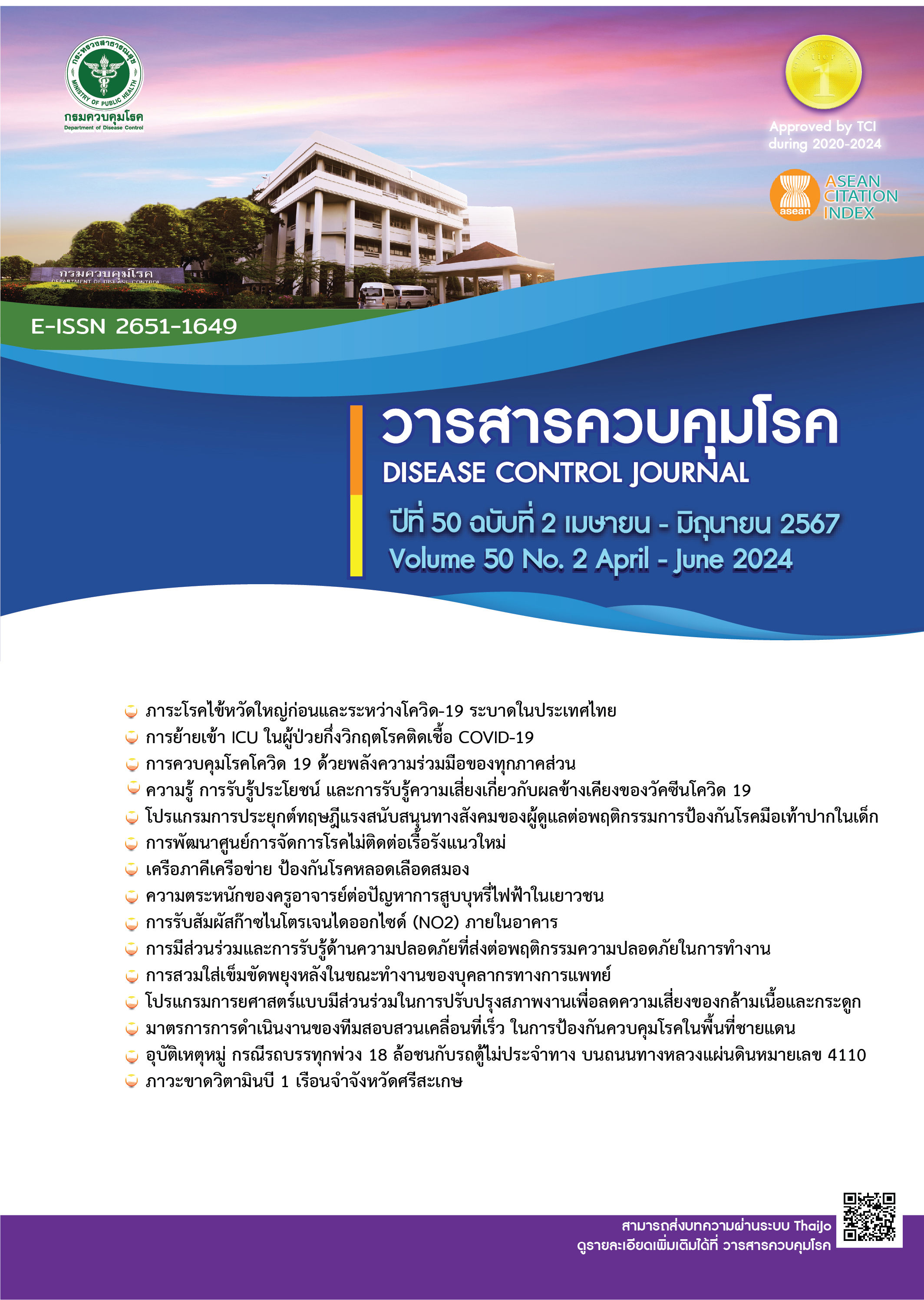Center Development for New Management of Chronic Non- Communicable Diseases by District Health Network's Participatory
DOI:
https://doi.org/10.14456/dcj.2024.21Keywords:
chronic disease new management center, diabetes, hypertension, District Health Network's ParticipatoryAbstract
This action research aimed to develop the center for district health network's participatory in chronic disease management and to study the results of a new chronic disease management center developing. The research was conducted February - August 2022 and divided into 3 phases: Phase I, the study of self-care methods of individual patients in the community, phase 2, the development process, and phase 3, the study of development outcomes. Data were collected by using questionnaires, interview forms, quantitative data analysis using descriptive statistics to describe the personal characteristics of the samples, health awareness and health behaviors. The qualitative data consists of service system, perspective customer view and budget perspective use content analysis together with quantitative data analysis. The results found that the outcome of the development consisted of 1) views on the service system, customer, and the budget perspective, were found that there was 1 non-communicable disease new management center. The overall quality of life of patients with chronic non-communicable diseases was at a good level by 87.50% and was able to reduce the cost of medical care for the patients. And 2) 96 patients (46.15%) who participated in activities and practices did not develop stroke and no complications. There were patients able to stop taking drugs to control blood sugar levels, 38 patients (18.27%) reduced the diabetes and hypertension medications using. There were 8 patients (8.33) who participated in the activities and practice, the doctor decided to stop using the medicine. Therefore, the new participatory non communicable disease management model is considered an effective method and should be further applied.
Downloads
References
Thanurat A, Wihakhir B, Srisanga Y. Handbook for organizing participatory learning on non-communicable diseases (NCDs). Nonthaburi: Divison of non-communicable disease; 2019. (in Thai)
Strategy and Planning Division, Ministry of Public Health (TH). Statistics report on patients with chronic non-communicable diseases [Internet]. 2021. [cited 2021 Dec 12]. Available from https://spd.moph.go.th/public-health-statistics/ (in Thai)
Department of Disease Control and Non communicable Diseases (TH). Health status information from the Ministry of Public Health [Internet]. 2021. [cited 2021 Dec 12]. Available from http://Healthdata.math.go.th/ (in Thai)
Office of the National Economic and Social Development Board. National economic and social development plan No.12 (2017-2021). Bangkok: Office of the National Economic and Social Development Board. 2018. (in Thai)
Nakhon Ratchasima Provincial Public Health Office. Chronic non communicable disease report 2021 [Internet]. 2021. [cited 2021 Dec 19]. Available from http://nma.hdc.moph.go.th/hdc/main/index_Pk.php (in Thai)
Nakhon Ratchasima Provincial Public Health Office. Chronic non communicable disease report 2021 [Internet]. 2021. [cited 2021 Dec 19]. Available from http://nma.hdc.moph.go.th/hdc/main/index_Pk.php (in Thai)
Inthakanok S, Satayavongthip B, Singsalasang A, Nguanjairak R, Seesan C, Salawongluk T. Development of village health volunteer’s capacity on chronic non-communicable diseases management: A study of the responsible area of Nam Sub Health Promoting Hospital, Pak Thong Chai District, Nakhon Ratchasima Province. DPC 9 J 2021;27(1):56-67. (in Thai)
Kemmis S, Mc. Taggart C. The action research planner. 3rd ed. Deakin University: Victoria. 1998.
Diabetes Association of Thailand under the Patronage of Her Royal Highness Princess Maha Chakri Sirindhorn. Medical practice guidelines for diabetes. Pathum Thani. Romyen Media. 2017. (in Thai)
Thai Hypertension Society. Thai guidelines on the treatment of hypertension. Chiang Mai. Trickthink. 2019. (in Thai)
Office of the National Economic and Social Development Council (TH). Annual report 2018. Office of the National Economic and
Social Development Council. Bangkok. 2018. (in Thai)
Singsalasang A, Satayavongthip B, Salawongluk T. Potential development among monks on disease protection and complication of chronic disease, Nong Phluang Subdistrict, Jakkarat District, Nakhon Ratchasima Province. Christian University journal 2021;28(1):88-100. (in Thai)
Singsalasang A, Salawongluk T, Nguanjairak R. Development of self-care competency enhancement course in the elderly school for prevention of dependency among the elderly. Dis Control J 2021;47(4):674-84. (in Thai)
Nguanjairak R, Phrongkhonburi N, Somboonnadee W, Salawonglak T, Satayavongthip B, Singsalasang A. Developing a training program of village health volunteers’ competency enhancement using the new approach of 4E(s) for managing NCDs, Takhob Sub-district, Pakthongchai District, Nakhon Ratchasima Province. Thai Journal of Health Education 2022;45(1):40-55. (in Thai)
Downloads
Published
How to Cite
Issue
Section
License
Copyright (c) 2024 Disease Control Journal

This work is licensed under a Creative Commons Attribution-NonCommercial-NoDerivatives 4.0 International License.
Articles published in the Disease Control Journal are considered as academic work, research or analysis of the personal opinion of the authors, not the opinion of the Thailand Department of Disease Control or editorial team. The authors must be responsible for their articles.






